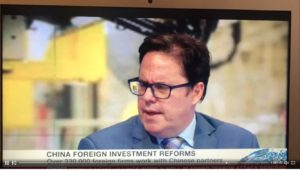
China-lawyer Mark Schaub gives a detailed overview of the drafted legal improvements foreign investors can expect when the phase 1 trade agreement will be in place. For example, the VIE’s will largely remain safe. That is, warns Mark Schaub, a huge if, he writes at the weblog of his law firm King & Wood Mallesons.
Mark Schaub on the regulatory regime change and VIE structures:
For many years, MOFCOM or its local divisions have been the approval authority for green field investment and merger and acquisition projects, and the State Administration of Industry and Commerce (now the State Administration of Market Regulation (SAMR) ) or its local divisions have been the registration authority for the FIEs.
Starting from the pilot scheme in 2013 at the Shanghai Free Trade Zone, the Chinese government has been implementing a different approach towards foreign investors. Namely moving from a catalogue which sets out comprehensively how foreign investment is treated in specific sectors to a “pre-establishment national treatment with negative list”. Basically the negative list sets out only sectors that are restricted or off limits.
The negative list approach was introduced nationally by the publication of Provisional Measures on Administration of Filing for Establishment and Change of Foreign Investment Enterprises[4] (the “Provisional Measures”) by the MOFCOM on October 8, 2016. According to the Provisional Measures foreign investment not falling within the scope of the negative list would only require a filing and not an approval.
It seems the Draft Regulations provides that the SAMR will take over all “approval” and “filing” roles for foreign investment including the incorporation or changes in registration (whether included on the negative list or not). This approach seems to have been confirmed in the draft Guidelines on Better Handling Foreign Investment Enterprises Registration that was issued by SAMR on 6 November 2019. [5]
VIE remain largely safe – One of the breakthroughs under the Draft Regulations is that a VIE structure may not be needed for Chinese investors’ round-trip investment arrangement in the circumstance where a Chinese investor (i.e. a Chinese individual, company or other organization) uses its wholly-owned enterprise established outside China to facilitate round-trip investments into China and approval is obtained from the State Council for the exemption of application of negative list. In other words, the Draft Regulations treat such round-trip investment (not all round-trip investment) as domestic investment and therefore restrictions or prohibitions set out in the negative list for foreign investment will not apply.
Notably, and consistent with the terms of the FIL, the Draft Regulations do not question the legality of VIE structures established in China by foreign investors which wish to circumvent restrictions on their investments. More details with regard to the necessity and application of VIE arrangement can be referred to our previous article at China: VIEs Alive and Well.
More at the weblog of his law firm, including investment protection, Sino-foreign JV with Chinese natural persons, investment management, and many unresolved issues.
Mark Schaub is a speaker at the China Speakers Bureau. Do you need him at your meeting or conference? Do get in touch or fill in our speakers’ request form.
Are you looking for more experts on the ongoing trade war between the US and China? Do check out this list.
